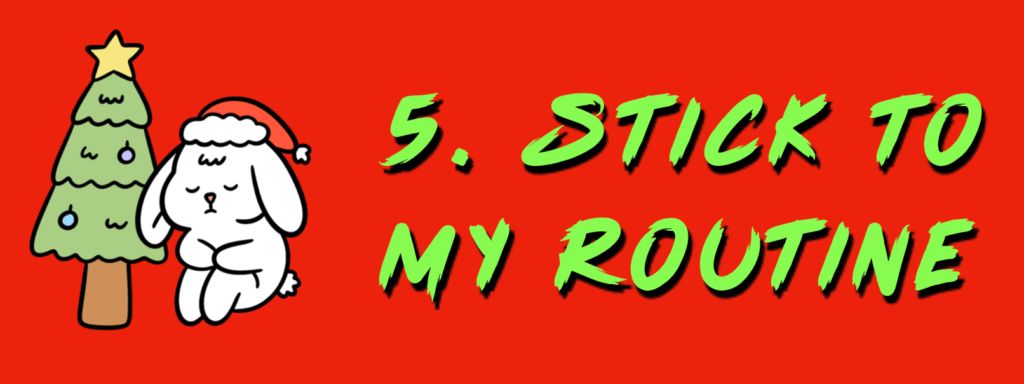The hardest period of each year for me, as an individual dually diagnosed with bipolar type 1 and addiction disorder, is the time between December 18th and January 7th. Here is why that specific timeframe annually poses challenges to my recovery.
December 18th always blindsides me. The anxiety involved with the run-up to Christmas Day is always an unwelcome surprise. I’m unable to avoid the cultural pressure to do something special for the holidays and get things done before the evening of December 24th. Finally, the long-awaited day is here as Christmas Eve quickly transitions to Christmas Day. Come sundown on Christmas Day, I always feel like the day never lived up to the months of unavoidable commercial and corporate hype.
The six days that follow Christmas aren’t easy for me either. Each day serves as a countdown to the end of the year. All media are focused on either reflecting back on the previous year or suggesting ways that you can better yourself in the New Year. Finally, New Year’s Eve arrives, and the pressure to do something eventful is back. After the clock strikes twelve, the festivities are officially over. New Year’s Day comes and goes.
Probably the hardest part of the Holiday Season is the first week of the year. I’m never sure when the Holiday Season is truly over. Christmas lights remain on houses, and decorations in stores are still displayed. Some of my friends are returning to work, and others just left for tropical vacations. The limbo of the first seven days of the year is irregular, unstructured, and somewhat depressing in nature.
I write these things not to ruin your Holiday Season. Many people draw great meaning from the Holidays. Since entering into recovery in 2010, I have discovered that some folks who struggle with mental health and addiction meet their greatest challenges in December and January. This is why I thought it would be important to share five things that I do to weather the emotional, mental, psychological, and spiritual challenges that I face each Holiday season.

During my first Holiday Season in recovery, I recognized that being around alcohol posed the greatest threat to my mental health. Alcohol is trigger number one. It was suggested that I carefully think through my activities throughout the holidays to avoid any triggers. This might seem simple, but it was a new concept for me.
Prior to finding recovery, come December, I would go wherever the wind took me. Merriment and cheer were synonymous with alcohol, so many of my pre-recovery memories during the Holiday Season involved aimless wandering for weeks. Interestingly enough, my previous Holiday Season binges were consistently triggered by a significant emotional and chaotic starting point. Every year, I have been careful enough to avoid ever being in such a slippery place, and it has worked.
Planning to avoid alcohol is one thing; however, dealing with people presents some challenges. If someone triggers you and compromises your wellness, it’s okay to avoid them as well. For over 13 years, I’ve been resolute in my Holiday plans and have seldom provided an explanation for avoiding individuals who trigger me. My first Christmas in recovery was straightforward: if I used to indulge with you or if you enabled my unhealthy behavior, I decided not to see you during the Holidays.
Over the years, it has become more challenging to steer clear of people who trigger me. It’s not the end of the world if I get triggered; in fact, it’s inevitable. That’s why I’ve never crafted my Holiday Season plans alone. I need help navigating this challenging season and planning whom I’ll spend my time with. The only way I’ve managed to avoid triggers and recover from being triggered is with the assistance of individuals who understand I’m in recovery and can offer support.

My support network is extensive, and it’s crucial for me to stay engaged over the Holiday Season. I maintain a robust support system, which includes a sponsor, regular attendance at 12 Step meetings, connecting with peers in recovery, consulting both a doctor and counselor, adhering to prescribed psychiatric medications and utilizing my Employee Assistance Program. I recognize that the Holiday Season has the potential to disrupt my support network for a solid three and a half weeks, which concerns me deeply every year.
Most importantly, I must stay vigilant about the pharmacy’s holiday closures and plan ahead for prescription refills. Ensuring I have a refill ready is essential, and if not, I must contact my doctor promptly to refill my prescription. My prescribed psychiatric medications play a fundamental role in my recovery, and any disturbance during the Holiday Season could pose a risk, potentially unraveling my overall wellness.
During this time, there might be instances when I’m away, or my sponsor or crucial recovery peers are unavailable, or I might miss my regular support group meeting. It’s crucial for me to be mindful of who I can reach out to if I require support. I proactively ensure awareness of support group meeting schedules and adapt them to fit my altered Holiday Season schedule.
Recognizing the importance of seeking professional help, I avoid procrastination. I have access to my Employee Assistance Program, online counseling, and a network of healthcare professionals. I must never believe that they will not be inconvenienced if I reach out to them. Entering the Holiday Season equipped with these resources allows me immediate access to professional help if needed, preventing any delays in seeking support.

Christmas parties, pubs, boozy family gatherings, venues with open bars, nightclubs, comedy clubs, casinos, and New Year’s parties are all locations I actively avoid. I’ve often chosen to depart family gatherings early and turned down invitations to bars, clubs, and other environments that I know could jeopardize my mental health. For several years now, I’ve been in bed and asleep at midnight on New Year’s Eve. Decisions like these aren’t selfish; to me, they are essential for maintaining my mental health and stability.
Despite my efforts to steer clear of high-risk environments, there have been occasions when I’ve decided to attend a Holiday Season event in a triggering place. However, most of the time, I’ve made these decisions with careful consideration in consultation with my support network. I always devise a plan and a backup plan in case I start feeling uncomfortable. If triggered, I’ve excused myself from family dinners to attend 12 Step Meetings, left Christmas parties early, and discreetly departed from numerous house parties without saying goodbye.
When it concerns high-risk environments, I never underestimate the power of memory. Certain neighborhoods where I used to reside, my hometown, or even specific houses have evoked memories from my pre-recovery years. It’s crucial for me to remind myself that if a place triggers me, I’m never alone, I’m not overreacting, and I can openly share any struggles with my support group if people, places, or things disrupt my wellness during the Holiday Season.

Anything can happen over the Holiday Season, and when it comes to addiction and mental health crises, it frequently does. I have to plan to call my support network. It is almost like a reflex I’ve been doing it so long. If I feel anxious, lonely, depressed, or unwell, the sooner I reach out for help, the faster I will find stability.
During my first holiday season in recovery, I made sure my contact list was full of useful numbers of peers who would support me, and I used them. Even over a decade later, some of those same phone numbers are still in my contacts, and they will be receiving calls this Holiday Season. This year I can approach the Holiday Season with confidence, knowing that professional and peer support is just a phone call away.
In the beginning of this article, I admitted that sometime between December 18th and January 7th, I am likely to experience the Holiday Season blues. There hasn’t been a year that has passed without feeling down, and thankfully, each time, I’ve immediately reached out for support by dialing those numbers in my phone. I’m open and vulnerable with my closest recovery peers, ensuring to give them a heads-up that they might receive a call or be asked to meet up.
The Holiday Season often involves travel. When I began my recovery journey, my intention was to enjoy life. However, whenever I board a plane, I ensure I’ve done the groundwork and preparation to have what I need upon arrival. My medications are filled, counted, packed in my carry-on, and double-checked before departure. If jet lag might disrupt my sleep, I plan to be gentle with myself as I adjust to the new time zone. Most importantly, I always schedule time to attend a 12 Step meeting, regardless of whether they’re in English or not. I’ve participated in meetings during the Christmas Holidays in various countries like Cuba, Portugal, France, across Canada, and the United States. Having a familiar place, like a 12-Step meeting, has always provided me with a sense of grounding and stability while on vacation or when visiting relatives.

During the Holiday Season, I find the lack of structure challenging. It’s a time when many of my good habits could easily slip away, especially at the start of the day. Despite working less during the holidays, I recognize the importance of maintaining a morning routine for my overall wellness. I’m familiar with the domino effect that can unfold: oversleeping leads to self-criticism, affecting my mood and triggering anxiety. If I’ve overslept in the morning I won’t be tired at night. This cycle often leaves me wide awake at bedtime, feeling both anxious and unable to sleep. Maintaining good sleep hygiene over the Holiday Season is imparative.
Ensuring physical activity remains part of my routine is crucial. Every Holiday Season all of my scheduled recreational activities (basketball and soccer) go on hiatus for a few weeks. It is important that I compensate and take the initiative to still remain active. I also must remember how important taking a walk is. Walking for twenty minutes during the day, enjoying the fresh air and sunlight, can significantly benefit my mental health amid the hustle and bustle the Holiday Season.
I’ve come to understand that during the Holiday Season, schedules will be disrupted, and routines will be altered. Learning not to panic if my routine goes awry has been important. Recovery wasn’t a journey I undertook alone. If I need help to get back on track, I remind myself that my phone and support network are just a phone call away.
These tactics have been crucial for me in coping with the Holiday Season. They might not be suitable for everyone, but they have proven effective for me. If you have your own tips for navigating the Holiday Season, feel free to share your insights and reply below. Additionally, if you have any feedback on what I’ve shared, make sure to share in the comment section, and I’ll be sure to respond. Sharing our experiences and insights can be incredibly valuable for all of us during this time.
Seasons Greetings,
Seth Perry


13 Responses
What can I do to help you and to be a part of your support system?
Thanks Alan. You do enough! Just check in with me on Christmas Eve and make sure that you remind me to talk plenty of walks, eat healthy and get plenty of sleep in between Christmas Day and New Years.
One of the most helpful and encouraging messages during Advent. May we all have a plan of self care, reduce our expectations and feast on the Light and incomprehensible Love of the Season. Thank you. Be well.
Absolutely!
Reducing expectations has been the absolute best thing for me. It helps having a supportive spouse. My wife says “What do we need a fancy Holiday meal for?” We always make a simple meal on Christmas Day now. So much more restful!
Avoiding triggers is a challenge. I’m not seeing my parents on Christmas Day because a. Exhaustion and b. My brother will be there and he is not good for my mental health. My parents will never understand this so I am trying to navigate through this. Prayers to you. Hope to see you soon.
Thank you Sarah!
I hope to see you soon. I have control where I am. My environment and the people that I spend time with are what I can manage. Best of luck with navigating this. Reach out if you need.
Thank you Seth!! I could relate with so much of this. My partner and I both struggle with the holidays for our own reasons but can empathize with each other on that. I think the more I keep to myself and stay quiet about the things that are triggering, bothering me, or putting me in a bad place, the darker things become. Having a plan and sharing that plan is key for me. Always know you’re not alone!
Thank you Seth for a great article. This is a reminder that can never be repeated enough. I am back home in Iceland visiting my family and already on holiday. I have a lot of spare time and thankfully I can manage my time and schedule so I’m not getting into unhealthy situations. I also like to double up my twelve step meeting attendance and go to two meetings a day. I appreciate not everyone can do that, although nowadays with online meetings there are less barriers than in the past. Gratitude and a positive outlook are my two biggest goals at this time. Reaching out to others is also essential as you mentioned, avoiding triggers, as well as maintaining a strong support network, seeking professional help if needed, avoiding high-risk situations and staying mindful of routines and self-care. My self care is going to the pool every day and walking. I also like to read at this time of year and I have a great book with me this year! Happy Holidays
Going to more meetings is something that I try and do as well. Preparing a list of online meetings is a good way of planning ahead.
I like how you mentioned gratitude. There are always things to be grateful for. The holidays have such a fast pace I need to stop and find some gratitude.
Enjoy your book!
I am navigating my 3rd holiday season after losing my husband. Its hard when it feels like the rest of the world has moved on. Grief is weird the way you are OK until you are not. Thanks for these.
Hi Renee,
I am sorry to hear about the loss of your husband. Make sure to reach out for help when you feel like the world has moved on while you still grieve. I can relate. Grief has often surprised me. When I have grieved loss I’ve often not known that I’ve carried it around until it hit me. If you are interested I wrote an article of grief here.
Praying that the support you need is there for you this Holiday Season.
Thank-you Brother for your open heart and wisdom. My grief at Christmas always astonishes me. It’s been since Dec 17, 1998 that I lost daughter in my 5th month of pregnancy. Celia Christine Joy Aime Smith. I have since miscarried 2 more babies. Once I survived all the pregnancies and births of my friends and family, I thought I’d find relief. No. Their children grew and had all the milestones a Mother appreciates. Then comes menopause! A real grieving of “now it’s NEVER gonna happen!” But guess what, now my peers are becomming grandparents! The children I never had having grandchildren I’ll never have!
I spend the first couple of weeks drowning myself in sugar! Chocolate, candies, baked goods, you name it! If it’s sweet and I can disappear into sugar oblivion, that’s where I’m at.
Then finally, I look at the date Dec 15th and my heart breaks. I finally call someone to cry and tell my painful story, I’m forever ALONE! No spouse, by choice these days, far more devastating, no children and grandchildren. I can only imagine creating a Christmas wonderland for the wee ones I never had and the excitement of Christmas Eve!! Those lovely little eyes of joy and anticipation remain in my imagination, year after year! Sorry, I don’t want to adopt, yes, I have many nieces and nephews! I grieve my OWN BABIES!
I know the solutions for self-care and I will now implement them now that I’ve shared my soul! No, I won’t drink, I won’t pick up a drug! The question is, will I begin my weight loss now? Or Jan 1st, like every year? It’s insane, I gain the same weight that I was at when I was 5 months pregnant! So, let the self loathing begin!!!
Forgive me, I’m still in the midst of this.
I appreciate your sharing in the solution as well. I will return there soon.
Be well, be blessed Seth and family.
PS I have my beautiful Zadie in all her furry glory to cuddle and kiss. She makes my day!
Thanks Christine.
I appreciate the time you took to comment. Make sure to connect with as many people in person locally as you can. Get outside when the sun is out. Don’t beat yourself up. Don’t be so hard on yourself.
I appreciate your vulnerability. I can never truly know what it feels like to go through what you endured. I can imagine the loss that you revisit each year. I pray that this December you find as much support as you can. Reach out if you need. You know where to find me.